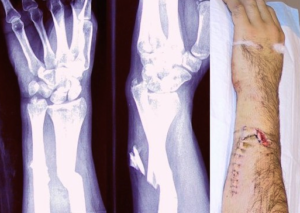INTRODUCTION
One of the more common injuries on a battlefield or in everyday life is a fracture.

Although usually not immediately life-threatening, serious fractures can be fatal if not properly treated. This subcourse discusses the procedures for immobilizing fractures and dislocations of the extremities using traction splints, wire ladder splints, SAM splints, pneumatic splints, and improvised splints. The subcourse also covers immobilizing a casualty with a suspected fracture of the spine.
Subcourse Components:
This subcourse consists of six lessons. The lessons are as follows:
Lesson 1: Fractures and Related Injuries
Section 2. Immobilizing a Suspected Spinal Injury
Lesson 4. Fractures of the Lower Extremeties
Lesson 5. Fractures of the Upper Extremities
Students who desire credit hours for this correspondence subcourse must meet eligibility requirements and must enroll through the Nonresident Instruction Branch of the U.S. Army Medical Department Center and School (AMEDDC&S).
